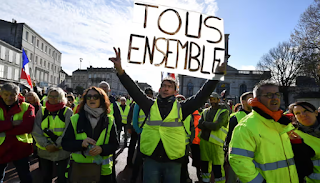Climate Inequality: The Stark Divide Between the Rich and the Poor in Carbon Emissions
New data obtained by The Guardian reveals a staggering reality – the wealthiest 10% of individuals in many countries are responsible for up to 40 times more carbon emissions than the poorest 10%. This stark divide emphasizes the crucial role the middle and upper classes play in shaping global emissions and underscores the need for policies that address this significant climate inequality.
Key Points:
Global Carbon Disparity:
- The top 10% globally, comprising the middle and upper classes in developed nations, are accountable for half of all global emissions.
- This shift in emissions inequality within countries, rather than between rich and poor nations, has profound implications for climate crisis solutions.
COP28 Climate Summit Imperative:
- The upcoming COP28 UN climate summit gains added urgency as this new data emphasizes the pressing need for inclusive and effective climate policies.
- A failure to consider this vast emissions gap may lead to public backlash regarding the affordability of climate action.
Transportation and Consumption Patterns:
- Transportation, particularly car use, stands out as a major contributor to the disproportionately high emissions of the wealthiest 10%.
- Consumption patterns, including the purchase of goods such as furniture and electronics, contribute significantly to carbon footprints, with the top 10% emitting 20-50 times more in this category.
Implications for Climate Policy:
- Dr. Lucas Chancel, from the World Inequality Lab, emphasizes the need to avoid policies that overlook emissions inequality, citing potential public backlash similar to the "yellow vests" protests in France.
- Tailored approaches, such as Canada's carbon tax that compensates potential losers, are essential to ensure fair and effective emissions reduction.
Future Projections and Millionaire Growth:
- The growth of millionaires, projected to rise from 52 million in 2020 to 511 million in 2050, raises concerns about the potential carbon emissions associated with increased wealth.
- Tackling the emissions of the rich becomes critical, especially considering the projected rise in millionaires and their potential impact on the remaining emissions budget.
Policy Recommendations:
- Ruth Townend from Chatham House stresses the importance of addressing inequality in policymaking to ensure a just transition to a sustainable society.
- Progressive wealth taxes and international taxation initiatives are proposed as measures to fund climate protection efforts and curb the emissions of the affluent.
Conclusion: As the climate crisis intensifies, the revelation of immense carbon inequality between the rich and the poor demands immediate attention. The COP28 summit becomes a pivotal platform for nations to craft policies that bridge this gap, ensuring a fair and collective effort to combat climate change.
#ClimateJustice, #COP28Action, #EmissionsInequality, #WealthImpact, #SustainableFuture

